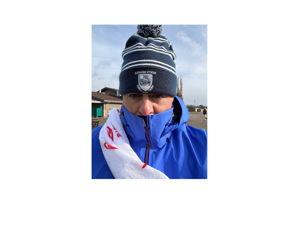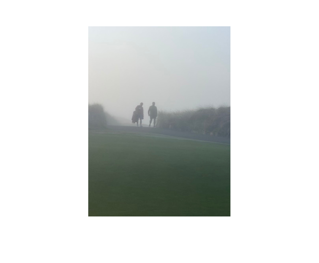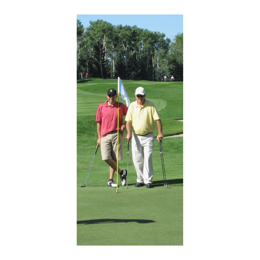The Ampersand November 2025
Q School
By Adam Pekarsky

Dear Friends and Colleagues,
Ever since returning from Scotland in late August, I’ve been writing a newsletter in my mind about caddies. While no doubt a perk on top of the perk of playing many of the best golf courses on earth, caddies over there aren’t as much of a luxury item as you might think. In addition to helping you navigate blind shots over berms and bunkers, they offer insights—about golf, certainly, but also about life. They are, after all, in the service business. And while I am under no illusion that our time together was anything more than transactional, I choose to believe there was something deeper to the connection.
I hadn’t put pen to paper on this topic because, until now, I have been unable to tether it to anything worth writing, let alone reading. Until now.
A friend and mentor of mine, Quincy Smith, known to most simply as “Q,” passed away recently, succumbing to Parkinson’s Disease at the age of 83. And it was his passing that finally gave shape to what had been swirling around in my brain: the quiet nobility and understated wisdom of carrying someone else’s bag—proverbially, if not literally. Q never looped for me in the golf sense, but he did in countless other ways that mattered.
Quincy was one of those rare figures whose presence lent weight and perspective to everything he touched. Humorous, humble, and wise, he had that glint in his eye that always seemed to say, “Don’t worry about it; no one cares that much.” During my two stints at the law firm—first as a practicing lawyer and later in an at-times polarizing professional development role—I spent countless hours in his office, learning mostly by osmosis, watching as he practiced the always thankless—and often dark—art of managing lawyers.
Though he was the Managing Partner in title, on reflection, he carried himself more like a grizzled caddie than a commanding captain—guiding with quiet confidence, letting you hit the shot but always there to offer perspective when it was needed, and conveying, through deed and word, that no matter how bad it was, it was never that bad.
I hadn't realized how much of Quincy had quietly rubbed off on me. But earlier this year, standing on a freezing cold tee box in Strathmore, Alberta, readying myself not to play but to loop, as us pros say, I could almost hear his voice in my head—gravelly, bemused, and unhurried—reminding me to stay calm, say less, and keep perspective. The kind of patience Q had modeled for years without ever naming it.
The Ampersand Unplugged
The Ampersand podcast explores issues that impact our community, businesses of all shapes and sizes and challenges impacting human capital and the human condition.
The Ampersand Delivered
Subscribe to The Ampersand and receive instant access to thought provoking articles on the human condition, the motivators & deterrents, the reason some excel while others fail, and the dirty little secret that the bottom 90% of the class usually do better than the top 10%. With over 11,000 subscribers and 175 posts and counting this is one newsletter you won’t be able to delete from your inbox.
SubscribeYou see, I had been asked to caddie for my 18-year-old son, Jacob, at an Alberta Amateur qualifying tournament on that windswept plot of barren prairie about 30 minutes east of Calgary. I’d love to tell you that my many years of accumulated links wisdom, relatively high golf EQ, and general disposition were the qualifications that secured me the job. In reality, I’m quite certain no one else was available, or applied, particularly given the single digit forecast highs, biting north wind, and occasional sideways rain that day.

I’d never caddied before, in the literal sense. I was the kid’s dad, so you could say I had daddied, but my bona fides, to the extent they needed to be established—other than a valid driver’s licence and knowing how to operate a rake—were qualities of patience and perspective: virtues I learned not on a golf course, but by spending countless hours in Quincy’s office, watching how wisdom could be exercised without ever being announced.
We didn’t qualify that day, but in a lifetime full of incredible golfing memories, caddying for my youngest son as he battled to make the cut, topped the list. And doing so with Q’s wisdom embedded somewhere deep within me reminded me that carrying someone’s bag is never just about the weight over your shoulder, but about the calm you bring to theirs.
It’s a humbling posture for any parent—that transition from coaching to caddying, from ordaining, superior to subordinate, to simply walking alongside, peer to peer, equally invested in an outcome that’s entirely out of your control, residing solely within his. I realized that what I felt wasn’t nostalgia so much as gratitude: the quiet joy of seeing my kid navigate something hard, and resisting the urge to intervene. Half the time, I wasn’t sure who was mentoring whom—me with my advice, or him with his composure.
Unlike dads, those Scottish caddies are playing for the tip. We all know that. And yet, when done right, it doesn’t diminish the authenticity of the relationship. It’s the same in business. A consultant is compensated. There’s an exchange involved. But the very best advisors—like the very best caddies—transcend the transaction. They make it about service, not servitude.
Think about the skill set of a great caddie:
- Gracious without being obsequious. They anticipate what you need before you ask, but never hover.
- Familiar without being too chummy. They’ll joke with you, but rarely cross the invisible line into over-familiarity (though the best ones will go there if you let them).
- Honest without being harsh. They’ll tell you that you’ve got the wrong club in your hand, but in a way that leaves your ego intact.
- Measured, subtle, and positive. Suggesting you “favour the right side,” as opposed to “avoiding all the trouble on the left.”
- Calm under pressure. When you’ve sprayed your drive deep into the gorse and ask, perhaps a little too hopefully, “Will we find it?”, you’re met not with disbelief but with dry wit. As one infamous Irish caddie once replied to that very question, “Eventually,” impliedly, though politely, measuring time not in minutes but in centuries.
If there’s another profession with a higher collective EQ than caddies, I’ve yet to engage with it. One that comes close, I dare say, is my own. In our daily toil, my colleagues and I aren’t carrying bags, but we are carrying weight—the weight of expectation, of trust, of careers and organizations riding on the right match. Like caddies, we have to read the moment quickly. As with golfers, not all clients are equally excellent, some wanting data, spreadsheets, and psychometrics; others seeking gut checks and reassurance. Some need encouragement; others need blunt truths.
And like caddies, we walk that fine line between proximity and distance. Too aloof, and you’re of little use. Too ingratiating, and you lose credibility. The art is in striking the balance—helpful but not hovering; candid but not cutting.
To carry someone’s bag for four hours is to enter into a strangely intimate compact—like a blind date with a fixed outcome: 18 holes, side by side, come what may. The best caddies are masters of emotional intelligence, able to take a read on their player within minutes. Are they here for banter or business? Can they handle a ribbing, or do they need quiet encouragement? Are they good enough to want yardages to the pin, or should advice be delivered more gently—“middle of the green’s never wrong, sir”?

Some of our caddies over the years have become friends. A few were aspiring young golfers, looping 36 holes a day to save up for Q-school. Others were older, retired types looking to get out of the house, stay fit and connected to the game. Each brings their own story, their own way of making four hours together feel more like a shared journey than a commercial arrangement.
The best caddies and the best consultants share a rare trait: they make their living in service to others, yet the true professionals aren’t there solely for the tip, just as we’re not there just for the fee. They’re there for the work—for the relationship—for the satisfaction of seeing someone else succeed, knowing they played a small part in it.
Which, inevitably, brings me back to Quincy.
When I first started Pekarsky & Co. back in 2009, I asked him if he would consider serving on our Advisory Board and, in so doing, lend his immense personal credibility to an enterprise with very little. Without hesitation, he said yes. That single “yes” changed everything. By lending his name, credibility, and gravitas to a fledgling firm taking its first shaky steps, Quincy gave us instant legitimacy. The sheer association made people take notice. But it wasn’t just symbolic. Quincy rolled up his sleeves. He showed up. He opened doors. He offered guidance. And in his quietly steadfast way, he always had my back.
Once, while at the law firm, there was a minor media kerfuffle; a misquote in The Globe and Mail had the Toronto partners in a full lather, their knickers well and truly knotted, eager to see whether I’d float once the firewood ran out. It could have gone sideways fast. But Quincy rallied the troops, calmed the waters, and kept me out of the proverbial bunkers. He didn’t just defend me; he believed in me. And there’s a difference.
With time, I’ve come to realize how rare that kind of loyalty is. Quincy was the kind of mentor who could steady your hands without ever taking the club from you. He led not through volume but through values—conviction, humility, humour, and grace. He never chased credit, never sought applause. He simply carried weight for others, quietly and with dignity.
I came upon this photo from 2009, when Quincy and I had occasion to play in a pro-am together—just two fellow golfers, peers in the moment, but separated by a lifetime of wisdom I was still too green to fully grasp.

Looking at it now, I see not the gap between our ages but the bridge between them—two players walking the same fairway, carrying different kinds of weight, each learning from the other.
There’s a passage in the caddie’s code at St Andrews that reads, “The caddie should never lose sight of the fact that he is there to help the golfer play his best golf. He should never forget that it is the golfer’s game.” That’s good advice not just for caddies, but for mentors, consultants, and parents.
Most of all, caddies remind me that the highest form of service is not about being noticed but about making others better. If a golfer plays well, they get the glory. The caddie gets a handshake, maybe a tip, and hopefully the chance to carry again tomorrow. Here at the firm, that’s what we aspire to every day—serving clients, candidates, and our community in ways that aren’t always visible but are always meaningful. Like caddies, our role is to offer perspective, judgment, and support. To walk alongside others with honesty and empathy. To carry the weight we can, and to make the rest a little lighter.
I often think about that day in Strathmore—the cold, the nerves, the small moments between us—and realize that maybe that’s what Q meant to teach me all along: that the real joy isn’t in playing your best round, but in helping someone else play theirs.
Regards,
Adam
To learn more about the incredible life of Quincy Smith, K.C., you can read his full obituary here and honour his legacy with a donation to the Calgary Stampede Foundation.
To enable comments sign up for a Disqus account and enter your Disqus shortname in the Articulate node settings.

